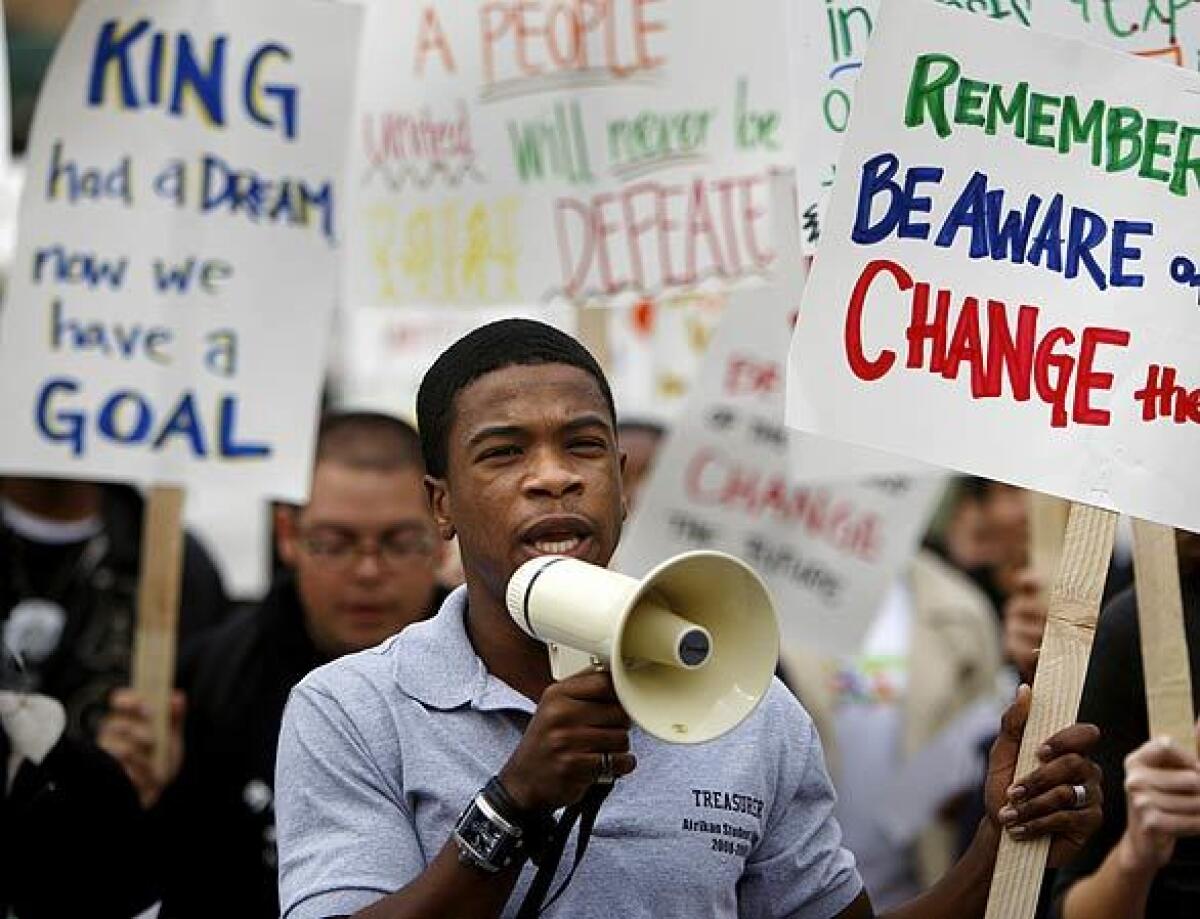Only 3% of UC Irvine students are Black. The ‘Black Thriving Initiative’ aims to change that

Calling anti-Blackness an “existential threat” to its mission, UC Irvine unveiled an ambitious plan Monday to intensify recruitment of Black students, faculty members and senior leaders and create a campus climate that supports their success.
A new Black Thriving Initiative, inspired by the surging demands for racial justice after the killing of George Floyd by a Minneapolis police officer, will expand research and teaching about the Black experience with 10 new faculty hires and a new program offering $30,000 research grants. The campus aims to increase its Black undergraduate student population, which at 3.3% last year was among the lowest in the 10-campus UC system, and also boost the number of those seeking graduate degrees.
UC Irvine is also launching an extensive review of its policing practices and classes about anti-Blackness. To hold itself accountable, the university will issue a biannual “scorecard” analyzing survey responses about the campus climate, progress in increasing Black representation and completion of anti-bias training. A new website offers resources to combat anti-Blackness and a robust new community engagement effort is planned.
“Anti-Blackness is an existential threat to our mission to be a place where all people can teach and learn and thrive,” said Douglas M. Haynes, vice chancellor for equity, diversity and inclusion. “We are committed to creating a national model for institutional transformation.”
The effort comes as campuses across the nation answer calls to reckon with racist legacies in society and their own institutions. In recent months, UCLA approved a Black Resource Center, which students have demanded for years. USC has announced an examination of its police force, more spaces for students of color and the hiring of a chief diversity officer. UC Berkeley, whose campuswide diversity initiative launched in 2018 resulted this year in the most Black and Latino students admitted in 30 years, will devote this academic year to an examination of social justice, racism and anti-Blackness.
For UC Irvine student Iyanna Blackburn, the efforts are long overdue. Blackburn, a rising senior double majoring in film and media and African American studies, said the campus is “perfect” except for the stark underrepresentation of Black students and faculty. Among UC’s nine undergraduate campuses, UC Irvine has the second-smallest proportion of Black students after UC San Diego.
Despite those small numbers, 57% of Black UC Irvine students who responded to a 2018 UC undergraduate survey said they felt their race was respected on campus. That is higher than at UCLA, UC Berkeley and UC San Diego.
Blackburn, who was raised in diverse Carson, said it was jolting to arrive at Irvine, where she was the only Black student in her dorm. She did not experience overt racism, she said, but had encounters that made her uncomfortable: non-Black students using the N-word when they listened to music and making assumptions that she would speak in Black vernacular or know the latest in rap and hip-hop; being the only Black student in classes where she was expected to be the voice of an entire community.
The experiences drove her to make a short film giving voice to UC Irvine Black students about their campus experiences. Students described being one of the few Black persons in their classes, witnessing other Black students being singled out by bad jokes, listening to non-Black students talk about whether they like to date Black people, being racially profiled in the surrounding community by a store security guard.
Jaylenne Thach, a student in philosophy and earth system science, said her non-Black sorority sisters asked her to straighten her hair for a formal so they would have the same look.
“That hurt me,” she told Blackburn. “As a black woman, it takes a long time for us to just accept our hair...to love our curls.”
Blackburn and other students said they found community and support in campus spaces for Black students — a Rosa Parks residential house, a living and learning community known as Black Scholars Hall, a resource center offering academic advising, career and professional development, health programs, financial aid assistance and other services.
“The spaces are therapeutic for us,” Blackburn said. “It feels like home. You don’t feel like you’re walking on eggshells.”
UC Irvine created the Black Scholars Hall and resource center as part of the campus response to demands by the Black Student Union in 2015. Now, Haynes said, the university is poised to take the next major step by focusing on academic concerns.
The campus already has made progress. This fall, 13 new Black faculty members — spanning fields of engineering, biological sciences, economics, history, English and dance — will join the campus as the largest such group ever hired in a single year. Other recent milestones include the appointments of UC Irvine’s first Black deans of the business and law schools.
Despite its Orange County location, where Black residents make up just 2% of the population, UC Irvine is drawing more California Black applicants. While the Black student population was at 3.3% last year, the campus received the second-highest number of California Black freshman applicants after only UCLA.
Also, the gap in first-year retention and graduation rates between Black students and all undergraduates is smaller than most of UC’s other top-tier research universities. The Black student first-year retention rate is 92.1%, compared with 93.9% for all students, while the six-year graduation rate is 81.7%, compared with 85% overall.
But that’s not good enough, Haynes said. The campus is planning to reevaluate its entire philosophy about how to teach and evaluate today’s students — questioning, for instance, whether the lecture format or grading on curves is still appropriate.
“As a campus, as much as we feel we have momentum in improving the experience of our Black students, faculty and staff, we can’t do this piecemeal,” Haynes said. “This is a national imperative that requires an equivalent response.”
More to Read
Sign up for Essential California
The most important California stories and recommendations in your inbox every morning.
You may occasionally receive promotional content from the Los Angeles Times.











